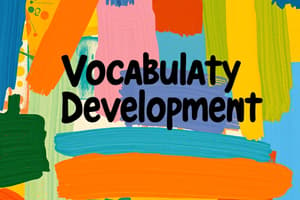Podcast
Questions and Answers
What is the primary benefit of having a strong vocabulary?
What is the primary benefit of having a strong vocabulary?
- It guarantees academic excellence.
- It aids in effective communication and enhances comprehension. (correct)
- It limits the need for reading.
- It simplifies communication only.
Which type of vocabulary consists of words that a person can use in speaking or writing?
Which type of vocabulary consists of words that a person can use in speaking or writing?
- Productive Vocabulary (correct)
- Expressive Vocabulary
- Receptive Vocabulary
- Passive Vocabulary
What strategy can enhance vocabulary retention through context?
What strategy can enhance vocabulary retention through context?
- Memorizing definitions.
- Using words in isolation.
- Learning words through sentences. (correct)
- Only reading specialized texts.
Which is a playful method to expand vocabulary according to the content?
Which is a playful method to expand vocabulary according to the content?
What role do quizzes and tests play in vocabulary development?
What role do quizzes and tests play in vocabulary development?
What is a common challenge faced by non-native speakers in vocabulary development?
What is a common challenge faced by non-native speakers in vocabulary development?
Which tool can effectively assist in vocabulary learning through interactive activities?
Which tool can effectively assist in vocabulary learning through interactive activities?
What is emphasized as a key attitude towards continuous vocabulary development?
What is emphasized as a key attitude towards continuous vocabulary development?
What does evaluative comprehension involve?
What does evaluative comprehension involve?
Which strategy is primarily aimed at enhancing comprehension by creating mental images?
Which strategy is primarily aimed at enhancing comprehension by creating mental images?
What type of comprehension is mainly concerned with the facts and details presented in a text?
What type of comprehension is mainly concerned with the facts and details presented in a text?
Identifying the author's purpose and tone is considered a skill necessary for which aspect of reading?
Identifying the author's purpose and tone is considered a skill necessary for which aspect of reading?
Which reading strategy involves taking notes and highlighting key ideas?
Which reading strategy involves taking notes and highlighting key ideas?
What is one of the common challenges that affects reading comprehension?
What is one of the common challenges that affects reading comprehension?
What is the primary purpose of using multiple-choice quizzes in assessments?
What is the primary purpose of using multiple-choice quizzes in assessments?
Which type of text generally focuses on delivering factual information?
Which type of text generally focuses on delivering factual information?
Flashcards are hidden until you start studying
Study Notes
Vocabulary Development
-
Importance of Vocabulary
- Fundamental for effective communication.
- Enhances reading comprehension and writing skills.
- Facilitates academic success and professional growth.
-
Types of Vocabulary
- Receptive Vocabulary
- Words understood when reading or listening.
- Productive Vocabulary
- Words used in speaking or writing.
- Receptive Vocabulary
-
Strategies for Vocabulary Development
- Reading Regularly
- Exposure to varied contexts enhances understanding.
- Diverse genres improve knowledge of terms.
- Contextual Learning
- Learning new words in context to grasp meaning.
- Using new vocabulary in sentences.
- Reading Regularly
-
Active Use of Vocabulary
- Flashcards
- Visualization aids memory retention.
- Practice active recall by testing oneself.
- Writing Exercises
- Incorporates new words into essays, journals, or creative writing.
- Encourages exploration of synonyms and antonyms.
- Flashcards
-
Engagement with Vocabulary
- Games and Activities
- Word puzzles, crosswords, and scrabble expand vocabulary playfully.
- Discussion Groups
- Conversing with peers aids retention and context application.
- Games and Activities
-
Technology and Vocabulary
- Apps and Online Tools
- Digital platforms offer various interactive activities for practice.
- Social Media
- Engaging with diverse content promotes exposure to new language.
- Apps and Online Tools
-
Assessment of Vocabulary Knowledge
- Quizzes and Tests
- Regular assessments help track progress.
- Personal Vocabulary Journals
- Tracking new words and usage develops self-awareness in vocabulary growth.
- Quizzes and Tests
-
Challenges in Vocabulary Development
- Language Barriers
- Non-native speakers face additional difficulties.
- Retention Issues
- Difficulty in maintaining long-term memory of new vocabulary.
- Language Barriers
-
Lifelong Learning
- Continuous vocabulary development is essential for personal and professional growth.
- Emphasis on curiosity and the desire to learn new words throughout life.
Importance of Vocabulary
- Strong vocabulary is crucial for effective communication and understanding.
- It enhances reading comprehension and writing skills.
- Strong vocabulary is also important for academic success and professional growth.
Types of Vocabulary
- Receptive vocabulary: Words understood when reading or listening.
- Productive vocabulary: Words used in speaking or writing.
Strategies for Vocabulary Development
- Reading Regularly:
- Reading diverse genres exposes you to a wide range of vocabulary.
- Reading helps you understand how words are used in different contexts.
- Contextual Learning:
- Learning new words in context helps you understand their meaning and usage.
- Use new words in sentences to practice and improve your grasp of them.
- Active Use of Vocabulary:
- Use flashcards to visualize and remember new words.
- Practice active recall by testing your knowledge of the words.
- Writing Exercises:
- Incorporate new words into essays, journals, or creative writing to improve their retention.
- Explore synonyms and antonyms to broaden your word knowledge.
Engagement with Vocabulary
- Games and Activities:
- Word puzzles, crosswords, and Scrabble provide fun ways to expand your vocabulary.
- Discussion Groups:
- Engaging in discussions with peers helps you retain new words and apply them in real-world contexts.
Technology and Vocabulary
- Apps and Online Tools:
- Digital platforms offer various interactive activities for vocabulary practice.
- Social Media:
- Engaging with diverse content on social media exposes you to new language and vocabulary.
Assessment of Vocabulary Knowledge
- Quizzes and Tests:
- Regular assessments help track your vocabulary progress.
- Personal Vocabulary Journals:
- Tracking new words and their usage develops self-awareness in vocabulary growth.
Challenges in Vocabulary Development
- Language Barriers:
- Non-native speakers may face additional difficulties in developing their vocabulary.
- Retention Issues:
- It can be difficult to maintain long-term memory of new vocabulary.
Lifelong Learning
- Continuous vocabulary development is essential for personal and professional growth.
- Emphasize curiosity and the desire to learn new words throughout life.
Reading Comprehension
- Definition: The ability to understand, interpret, and analyze written text.
- Key components:
- Literal comprehension: Understanding the explicit meaning of the text (factual information and details).
- Inferential comprehension: Reading between the lines to understand implied meanings and themes.
- Evaluative comprehension: Analyzing and critiquing the text using personal opinions and experiences.
Strategies for Improving Reading Comprehension
- Previewing: Skimming headings, subheadings, and illustrations before reading the text.
- Annotating: Taking notes, highlighting key ideas, and writing summaries in the margins.
- Questioning: Asking questions before, during, and after reading to maintain engagement.
- Visualizing: Creating mental images based on descriptions to enhance understanding.
- Summarizing: Restating key ideas in your own words after reading.
Common Skills Required
- Identifying the main idea and supporting details.
- Recognizing the author's purpose and tone.
- Understanding text structures (chronological, cause/effect, compare/contrast).
- Making connections to prior knowledge and personal experience.
Common Text Types
- Fiction: Novels and short stories focused on narrative structure.
- Non-fiction: Articles and essays providing factual information.
- Poetry: Uses rhythm, metaphor, and symbolism requiring interpretation.
- Informational Texts: Charts, graphs, and technical manuals emphasizing data comprehension.
Assessment Methods
- Multiple-choice quizzes to test factual recall.
- Short answer responses assessing inferential skills.
- Essays or reports evaluating critical analysis and synthesis of information.
Importance of Context
- Understanding the context (historical, cultural, and social) enhances comprehension and interpretation.
Challenges
- Vocabulary knowledge: Limited vocabulary can hinder comprehension.
- Text complexity: Longer and more complex texts can increase difficulty.
- Distractions and reading fatigue: Can affect concentration and understanding.
Reading Fluency
- The ability to read smoothly and accurately, contributing to better comprehension.
Practice
- Regular reading across various genres enhances skills and builds confidence.
- Discussing texts in groups helps gain different perspectives.
Studying That Suits You
Use AI to generate personalized quizzes and flashcards to suit your learning preferences.




